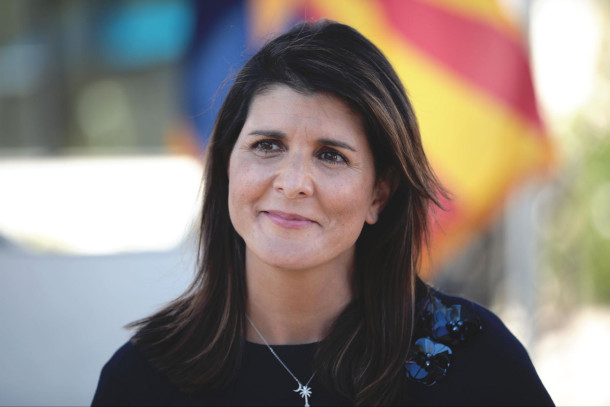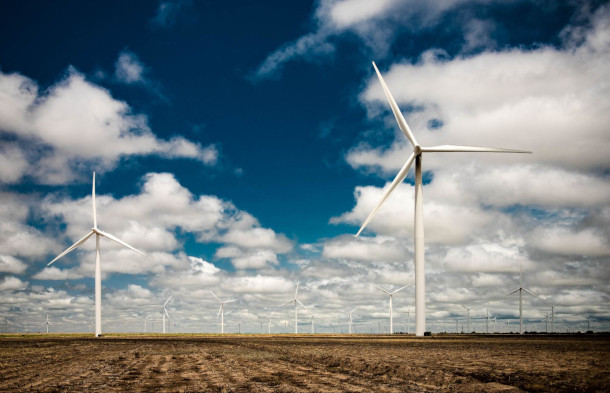House Republicans Oppose Environmental Justice
Air Date: Week of December 8, 2023

The first bill passed through the House under Speaker Mike Johnson’s leadership aims to cut five to six billion dollars of funding from the Inflation Reduction Act. (Photo: Gage Skidmore, Flickr, CC BY-SA 2.0)
The very first bill that Speaker Mike Johnson passed through the House would gut many energy and climate projects funded by the Inflation Reduction Act, even though Republican states are massively benefiting from this funding. The repeal would also block environmental justice efforts and deny a “just transition” for disadvantaged communities. Opinion writer Derrick Jackson joins Host Steve Curwood to discuss what he calls racist and hypocritical elements of the House GOP agenda.
Transcript
DOERING: From PRX and the Jennifer and Ted Stanley Studios at the University of Massachusetts, Boston this is Living on Earth. I’m Jenni Doering.
CURWOOD: And I’m Steve Curwood.
House Speaker Mike Johnson of Louisiana hasn’t held his new title for long, but he is already trying to slash key legislation enacted in the Biden Administration. The first bill passed in the House under the leadership of the Louisiana Republican aims to gut the 2022 Inflation Reduction Act which included nearly $370 billion in climate and clean energy funding. It would also eliminate the President’s Justice 40 initiative, which mandates that at least 40 percent of the overall benefits from federal climate and infrastructure investments go to underserved communities that have historically borne the brunt of pollution and climate change impacts. Derrick Jackson is a Union of Concerned Scientists Fellow in climate and energy and a contributing opinion writer for Environmental Health News. He’s here to talk to us about how Speaker Johnson is revealing key aspects of the Republican agenda moving forward.
Welcome back to Living on Earth, Derrick!
JACKSON: It's good to be back.
CURWOOD: So we're talking about Republican Mike Johnson of Louisiana, who's been Speaker of the House for just over a month now, Derrick. And you've written opinion pieces about him. Tell me how do you feel about the first bill that passed through the House under his leadership? And what does that bill propose exactly?
JACKSON: First, we should just say that it's a bill that will not likely see the light of day at least right now because it would have to be approved by the Democrats in the Senate and signed by President Biden, which would not happen. That said, it's really interesting to note what the agenda of the GOP is on this. The very first bill that Mike Johnson pushed through the House was one that would gut much of the energy and climate change related aspect projects under the Inflation Reduction Act, five to six billion dollars worth. It would eliminate clean energy and efficiency efforts through the Department of Energy, it defunds a national Climate Corps, it would block funding for state net zero programs. And it would actually stop the government from factoring in the social costs of greenhouse gases.
CURWOOD: Now, to what extent dies Speaker Johnson's bill address the Inflation Reduction Act's funding for communities of color that have disproportionately borne the brunt of pollution?
JACKSON: It basically would gut any support for those communities. What is kind of really extra interesting, as an African American about this, is the very, very blatant fine print, which for me is not fine print, of attacks on programs that clearly would benefit people of color. It would ban funding of the White House's Justice 40 initiative, which would direct the benefits of environmental projects toward communities of color, many of those communities which have disproportionately suffered from pollution and other degradation from the nation's fossil fuel industry and climate change. It would block funding for a more diverse science workforce that would have connections to these communities that might be better positioned to let us know what those communities need. It would block funding for a new national laboratory that will be focused on diverse communities. In fact, it's such a manic fine print, that they would even ban "any discussion of 'critical race theory' in the Department of Energy" and in any aspect of environmental injustice. To me, it's a real, real indicator that they want no historical discussion of why Black and brown communities and indigenous communities have suffered decades and decades of disproportionate environmental impact and toxicity.

The bill also bans funding of the Biden Administration’s Justice 40 initiative, which would primarily benefit communities of color that disproportionately bear the brunt of pollution. (Photo: Pixabay, Pexels)
CURWOOD: So you're a columnist, you share your opinions. What's your opinion of why?
JACKSON: You know, I think what's interesting about this whole thing is that it really represents a massive hypocrisy of the GOP, because since this very Inflation Reduction Act that they are attacking on the public side, that very IRA has triggered nearly 250 projects of electric vehicle factories, other renewable energy factories, and guess what? It's unleashed about $100 billion of investment right now, 73% of that investment is in states that Donald Trump won, or are controlled by Republican legislatures. In fact, there are three states that have at least $10 billion of this investment: Georgia, South Carolina and North Carolina. And South Carolina is interesting because the former governor and current presidential candidate Nikki Haley condemned the Inflation Reduction act as a "communist manifesto, filled with tax hikes and green subsidies." And there are seven other states with at least a billion dollars of this investment: Alabama, Indiana, Ohio, Oklahoma, Tennessee, Texas and West Virginia. That's not exactly a flaming blue progressive list of states. And so it's a two faced game, Steve, where in public, the GOP says the renewable future is impossible, or we got to go slow and gas and oil have got to be part of the big picture. And at the same time, in private, reaping the benefits. And by the way, this is not a new playbook. Eighty five, eighty six percent of onshore wind farms are in Republican held districts. So this shows that the Republicans really know what the deal is in terms of where the future's got to go in this country. And yet, while these Republican states are garnering three fourths of the renewable energy benefits in manufacturing from the IRA, the legislation would deny the benefits to communities of color, and other places that are supposed to be participating in the "just transition."
CURWOOD: So why would Speaker Johnson want to gut a program that clearly gives Republican states so many benefits? What's going on?

South Carolina’s former governor and current Republican presidential candidate Nikki Haley called the Inflation Reduction Act a “communist manifesto, filled with tax hikes and green subsidies.” (Photo: Gage Skidmore, Flickr, CC BY-SA 2.0)
JACKSON: I think right now it's all show, because I'm absolutely sure he knows that the GOP is getting three fourths of the benefits of the IRA in their districts. I do think that the racial aspects of this bill are very dangerous for 2024. I think that is a symbolic signal to send to the base, that on one hand, we're really happy to take the benefits of the IRA. On the other hand, we're basically putting into law barriers for Black and brown and indigenous communities to get the same benefits. I think it's part of this real, real panic by some sectors of white America, conservative white America, that this nation is rapidly becoming majority of color. And this is part of taking advantage of the future while denying the benefits of the future to other people.
CURWOOD: So to what extent do you think that Speaker Johnson is operating from a racist mindset?
JACKSON: I would say that Johnson represents a mindset, I don't know about him personally, it's not terribly of interest for me to talk about individuals as racist. What I look at is how the system operates. And clearly, when you embed in your legislation several notations that would attack communities of color, and this bill definitely attacks communities of color by denying the history of pollution and denying funds for a diverse workforce, that represents to me leading a systemically racist effort to deny a just transition to those communities.

Seventy three percent of investments unleashed by the IRA have been funneled into largely Republican-controlled states. (Photo: Daxis, Flickr, CC BY-ND 2.0)
CURWOOD: So the way the Congress stands, even if this bill, even if this measure that Speaker Johnson has proposed gets passed through the Senate, President Biden has said that he will veto it, right? But what does this tell us about the Republican agenda on climate change moving forward? Why should we be paying attention?
JACKSON: We should absolutely be paying attention because right now, it would not pass. But I think this is a blueprint for a second Trump term. And the first Trump administration has already shown its disdain for any benefits of the just transition going to communities of color, by its attempt to gut many, many EPA laws, and chemical pollution laws. The programs that the Biden White House have tried to do, such as Justice 40, this is really the first administration that really, finally is trying to put some money toward communities that have suffered environmental injustice, all that goes away. All that disappears. So I think this is an important shot across the bow that should not be mistaken by anyone who thinks climate should be a top issue for 2024. And what is really interesting about this, Steve, is that already, there was a major poll this spring where two thirds of Black and Latino respondents said that climate change is a critical issue in the nation's interest. Less than 50% of white respondents say that. And clearly, white respondents are split along party lines. Black and brown people have already spoken, that they want action on climate change. The issue is now whether attempts at legislation like this get some people off the fence, get some white people off the fence, to realize how dangerous this is.

Opinion writer Derrick Jackson says this bill sheds light on what the Republican agenda might look like if former President Trump returns to the White House in 2024. (Photo: Gage Skidmore, Flickr, CC BY-SA 2.0)
CURWOOD: Derrick Jackson is a Union of Concerned Scientists Fellow who blogs on the climate and energy and contributes to Environmental Health News with his opinions. Thanks so much for taking the time with us today.
JACKSON: Thank you for having me on, Steve.
CURWOOD: We reached out to the offices of Speaker Mike Johnson and Republican presidential candidate Nikki Haley for responses but did not hear back from either in time for broadcast.
Links
Read Derrick Jackson’s Blog from the Union of Concerned Scientists
Read President Biden’s statement on his plans to Veto Bill 4394
Living on Earth wants to hear from you!
Living on Earth
62 Calef Highway, Suite 212
Lee, NH 03861
Telephone: 617-287-4121
E-mail: comments@loe.org
Newsletter [Click here]
Donate to Living on Earth!
Living on Earth is an independent media program and relies entirely on contributions from listeners and institutions supporting public service. Please donate now to preserve an independent environmental voice.
NewsletterLiving on Earth offers a weekly delivery of the show's rundown to your mailbox. Sign up for our newsletter today!
 Sailors For The Sea: Be the change you want to sea.
Sailors For The Sea: Be the change you want to sea.
 The Grantham Foundation for the Protection of the Environment: Committed to protecting and improving the health of the global environment.
The Grantham Foundation for the Protection of the Environment: Committed to protecting and improving the health of the global environment.
 Contribute to Living on Earth and receive, as our gift to you, an archival print of one of Mark Seth Lender's extraordinary wildlife photographs. Follow the link to see Mark's current collection of photographs.
Contribute to Living on Earth and receive, as our gift to you, an archival print of one of Mark Seth Lender's extraordinary wildlife photographs. Follow the link to see Mark's current collection of photographs.
 Buy a signed copy of Mark Seth Lender's book Smeagull the Seagull & support Living on Earth
Buy a signed copy of Mark Seth Lender's book Smeagull the Seagull & support Living on Earth

